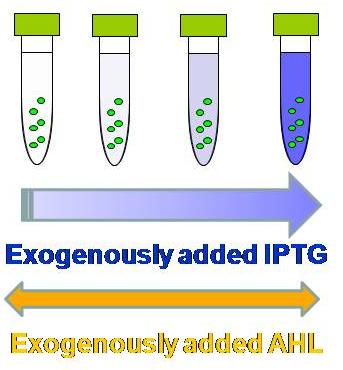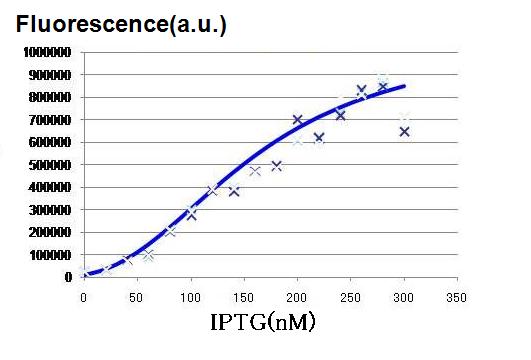Tokyo/IPTG assay
From 2007.igem.org
Works top 0.Hybrid promoter 1.Formulation 2.Assay1 3.Simulation 4.Assay2 5.Future works
Objective of this assay Effect of AHL Effect of LacI-IPTG Preliminary assays
LacI-IPTG assay
Objective:
To determine the order of the concentration of IPTG necessary for the activation of our lux-lac hybrid promoter in the LacI producing pTrc99A cells.
The order of the concentration is used for more detailed assay with narrower range of the IPTG concentration.
Samples:
A4 pcI(BBa_I751103) into pTrc99A cell
A4 ΔP(BBa_I751100) into pTrc99A cell
A4 ΔP + Lux-lac hybrid promter (BBa_I751101) into pBR322 cell
A4 ΔP + Lux-lac hybrid promter (BBa_I751101) into pTrc99A cell
Procedure:
prepare overnight culture for each sample
make fresh culture
take 3 ul of the overinight culture into 3 ml of LB (Amp and/or Kan) in Falcon tubes.
incubate for 2 to 3 hours until the observed OD is around 0.5
add AHL & IPTG solution
[AHL]final (in 3 ml LB culture) = 10 nM
[IPTG]final (in 3 ml LB culture) = 1000, 100, 10, 1, 0.1, 0.01, and 0 mM
incubate for 2 to 3 hours
apply 150 ul of samples into 96-well plaste
FLA measurement
Result & Conclusion:
As the concentration of IPTG increases, GFP fluorescence increased, indicating that the hybrid promoter in the LacI expressing cell became increasingly strengthened by decreasing repression by LacI. The activation graph in Fig. 2, the characteristics of the hybrid promoter expressed in Hill function is determined.
n3 = 2.47 (-)
K3 = 0.295 (μM)

